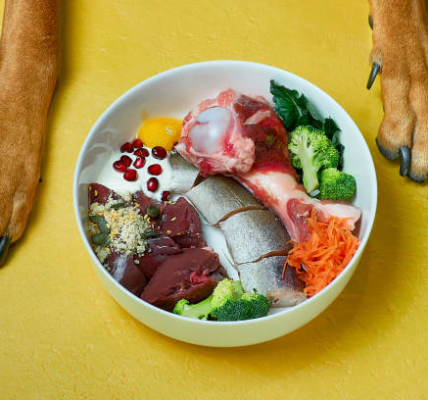
What can dogs eat? Feeding your dog properly is essential for ensuring a long, healthy, and happy life. Whether you’re a first-time dog owner or a seasoned pet parent, understanding what is safe to feed your dog, what foods should be avoided, and how to select quality dog food is critical. Let’s dive into the specifics of dog nutrition, from safe human foods to commercial dog food choices, as well as the foods that are harmful to dogs and why.
Safe Foods for Dogs
What can dogs eat and be safe? While dogs primarily thrive on commercial dog food, many human foods are safe and can even be healthy for them in moderation. Here’s a list of safe and nutritious foods you can give your dog:
- Lean Meats
- Chicken, turkey, and beef: Plain, cooked, and unseasoned chicken, turkey, or lean beef is an excellent source of protein for dogs. Always remove bones (especially in chicken, as they can splinter) and fatty trimmings to avoid health risks like pancreatitis.
- Fish
- Salmon and sardines: Fish is rich in omega-3 fatty acids, which promote healthy skin, a shiny coat, and support brain health. Cook the fish properly and avoid seasonings. Sardines, in particular, are a safe option because of their small size and low mercury content.
- Fruits
- Apples: Apples provide fiber and vitamins like A and C. Make sure to remove the core and seeds, as apple seeds contain cyanide, which is toxic to dogs.
- Blueberries: Blueberries are packed with antioxidants, which are beneficial for both humans and dogs.
- Bananas: Bananas are rich in potassium and fiber. They are a healthy snack in moderation, but the high sugar content means they should only be given occasionally.
- Vegetables
- Carrots: These are great for dogs to chew on, providing fiber, beta carotene, and vitamins, as well as promoting dental health.
- Pumpkin: Plain, canned pumpkin is a great source of fiber and helps with digestive issues. It can ease constipation or diarrhea.
- Green beans: Full of fiber, low in calories, and safe for dogs, green beans can help with weight management.
- Sweet potatoes: Sweet potatoes are another source of fiber, vitamins, and minerals. Cook them thoroughly and serve in moderation.
- Dairy (in small amounts)
- Plain yogurt: Unsweetened, plain yogurt is a source of probiotics, which can promote gut health in dogs.
- Cheese: Low-fat cheese like cottage cheese is safe for most dogs in moderation. Be mindful that some dogs may be lactose intolerant, so introduce dairy slowly.
- Grains
- Rice and pasta: Plain, cooked white rice and pasta can be a good source of carbohydrates for dogs with upset stomachs. Brown rice is also fine but harder to digest.
- Peanut butter (unsalted, unsweetened)
- Peanut butter can be a tasty treat, rich in protein and healthy fats, but ensure it does not contain xylitol, an artificial sweetener that is toxic to dogs.
Foods to Avoid
What can dogs eat that is not safe and should be avoided? Several human foods can be dangerous or even deadly for dogs. Here’s what to avoid and why:
- Chocolate
- Chocolate contains theobromine, which dogs cannot metabolize efficiently. This can lead to vomiting, diarrhea, heart problems, and in severe cases, death. Dark chocolate and baking chocolate are particularly dangerous.
- Grapes and Raisins
- Grapes and raisins can cause sudden kidney failure in dogs. Even a small amount can be toxic, so they should be completely avoided.
- Onions, Garlic, and Chives
- These vegetables contain thiosulfate, which is toxic to dogs and can cause damage to red blood cells, leading to anemia. All forms (raw, cooked, powdered) should be kept away from dogs.
- Avocados
- Avocados contain persin, which can cause vomiting and diarrhea in dogs. While small amounts of the flesh might be fine, the pit, skin, and leaves are highly toxic, so it’s best to avoid it entirely.
- Xylitol
- This artificial sweetener is found in sugar-free products like gum, candy, and some peanut butters. It can cause a dangerous drop in blood sugar levels (hypoglycemia) and lead to liver failure.
- Alcohol and Caffeine
- Alcohol and caffeine are both toxic to dogs, causing issues ranging from vomiting and diarrhea to seizures and even death. Make sure your dog never has access to coffee, tea, alcohol, or energy drinks.
- Raw Dough
- The yeast in raw dough can continue to rise in a dog’s stomach, causing painful bloating, and producing alcohol as it ferments, which can lead to alcohol poisoning.
- Fatty and Fried Foods
- Foods high in fat, like bacon or fried snacks, can cause digestive issues and increase the risk of pancreatitis, a painful inflammation of the pancreas.

Commercial Dog Food: What to Know
What can dogs eat in commercial food? When adopting a dog, one of the first things you should research is the best commercial dog food options. Dog food comes in several forms, such as dry kibble, canned wet food, and fresh/frozen meals. Here are key things to consider:
- Nutritional Balance
- Dogs require a balance of proteins, fats, carbohydrates, vitamins, and minerals. High-quality dog food brands will meet AAFCO (Association of American Feed Control Officials) standards for complete and balanced nutrition. Always check for this certification on dog food packaging.
- Age-Appropriate Food
- Puppies, adult dogs, and seniors all have different nutritional needs. For example, puppies need food that supports growth and development, while older dogs may benefit from lower-calorie options to prevent weight gain.
- Breed and Size-Specific Food
- Larger breeds may need food that supports joint health and slower growth during puppyhood to avoid hip issues. Small breeds may require more calorie-dense food due to their faster metabolisms.
- Wet vs. Dry Dog Food
- Dry kibble is convenient, helps clean teeth, and is often more affordable, while wet food can be more appealing to picky eaters and provides extra moisture. A combination of both can work for many dogs.
- Food Allergies and Sensitivities
- Some dogs may develop allergies to common ingredients like chicken, beef, wheat, or corn. If your dog shows signs of allergies (itching, skin irritation, digestive issues), you may need to switch to a specialized diet.
Feeding Schedule and Portions
What can dogs eat and how much? Knowing how much and how often to feed your dog is just as important as the type of food. Overfeeding can lead to obesity, which increases the risk of joint problems, diabetes, and heart disease. Most dog food packaging will include a feeding guide based on your dog’s weight. It’s generally recommended to feed adult dogs twice a day and puppies three to four times daily.
Proper nutrition is the foundation of your dog’s health. While many human foods are safe for dogs, it’s essential to know which foods are toxic to avoid any health risks. When it comes to dog food, always prioritize balanced, quality products suited to your dog’s age, size, and activity level. By being mindful of what you feed your dog and understanding their nutritional needs, you’ll ensure they live a happy and healthy life.



